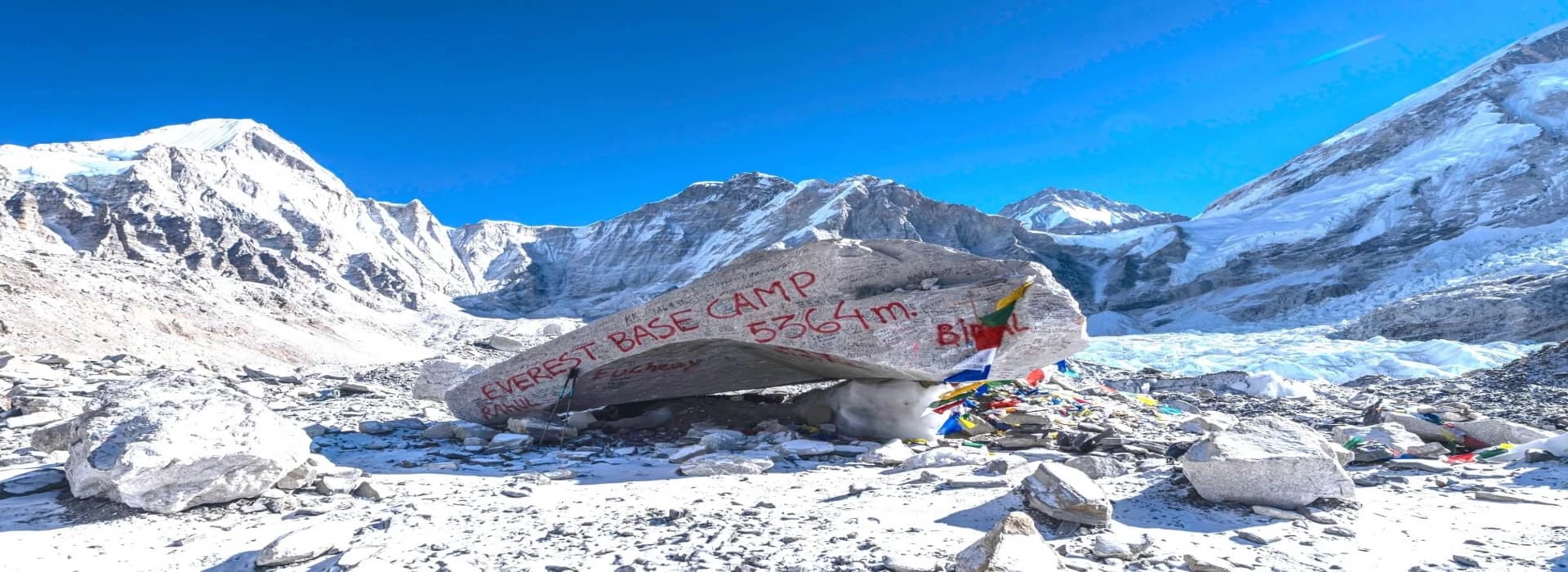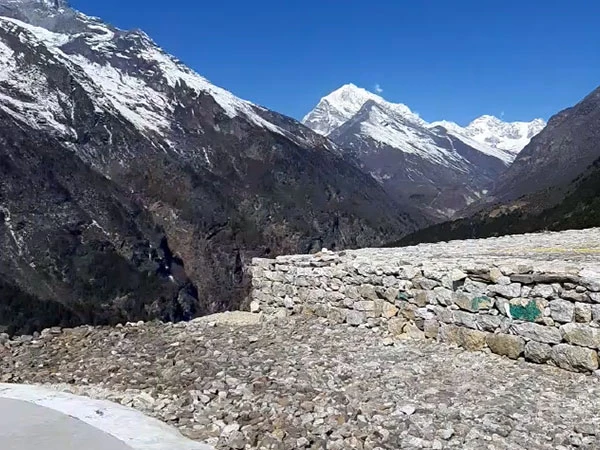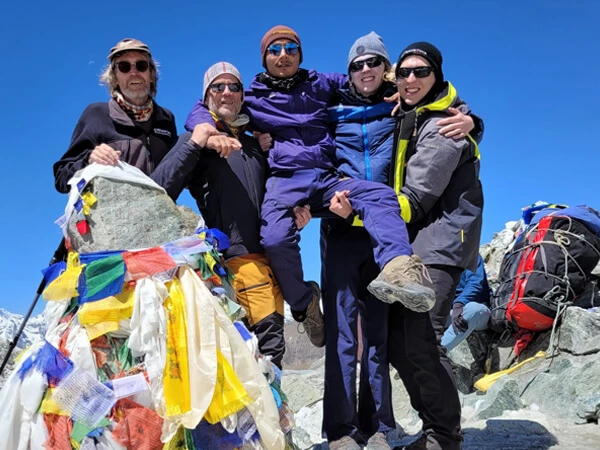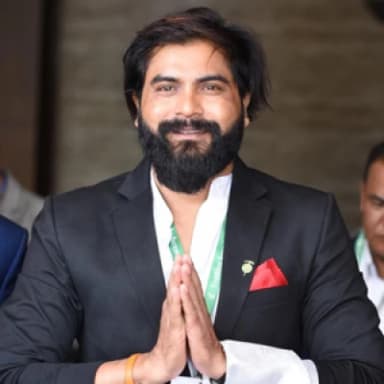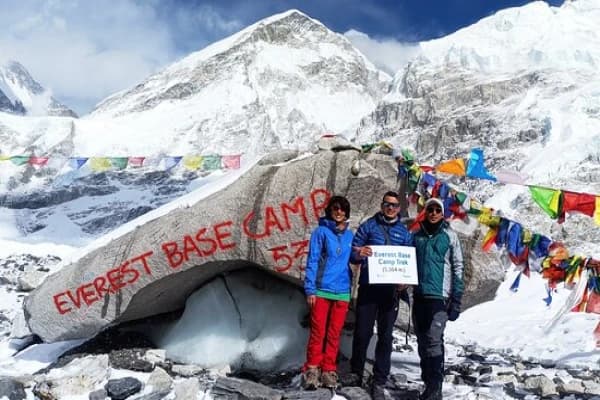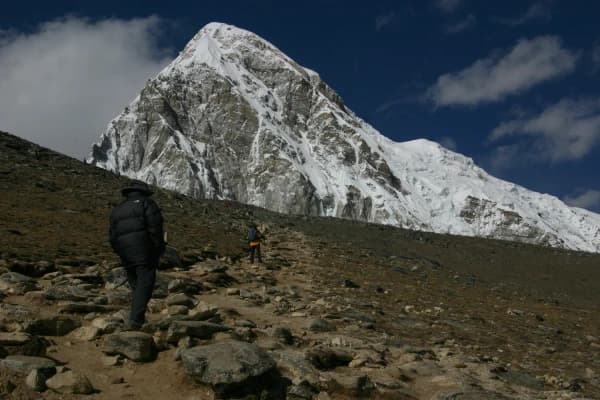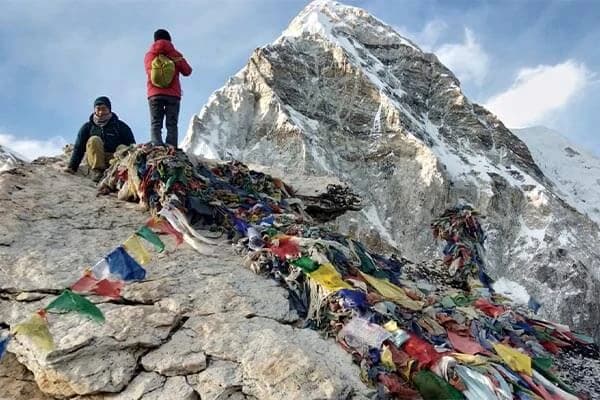Each year thousands of people embark on a Camp Trek into the Himalayas of Nepal. The typical cost for an Everest Base Camp Trek is probably between $1200-$2000 per person for a 12 to 14 day package.
This cost usually includes: the permits we need, round trip tickets from Kathmandu to Lukla, guided services, lodgings in tea houses, and meals during the trek. There are budget treks that will start around $950, and fully supported or luxury trekking packages are available that can include very high level comforts and could cost more than $4000.
Other items that usually are not included in a trekking package costs involve items that you would spend on trek gear, personal items, tips, and any added activities upon completion of your trek, and trekkers should consider the need to carry extra funds for these expenses.
The trek to Everest Base Camp not only offers some of the most stunning mountain scenery available, it also contains cultural elements, and interaction with unique vocabulary with colorful Sherpa towns along the way, breathtaking rhododendron forests, and ultimately leads you to the Khumbu Glacier.
Our trek begins on the day of our exhilarating flight into Lukla, winding our way up the trail to gorgeous towns, through the world's busy bazaar in Namche, onwards to spend the night in Tengboche, Dingboche, and Lobuche.
Each day we will encounter stunning new sights and landscapes to entertain us all, culminating in our trek to Everest Base Camp (5364m) and the hoped for viewpoint of Kala Patthar (5545m) where trekker's can experience the view of sunrise over Everest.
Our schedule will involve hiking 5-7 hours, a total distance of approximately 130km (duration of approximately 12-14 days). Our itineraries have been designed for gradual acclimatization, leaving lots of time to appreciate the cultural subtleties of the local population, ancient monasteries and the elevation of the highest peaks in the world.
Quick Glance at the Everest base camp trek cost
- A complete Everest Base Camp trekking package is likely to set you back between $1,200 and $1,700.
- The domestic flights to Lukla are likely to be between $350 and $400, but any delays or cancellations are out of your control, especially due to weather.
- Travel insurance is required in case of any medical expenses related to high-altitude trekking.
- The accommodation fees along the trek can run between $40–$120 per night, depending on the location, accommodation type, and amenities incurred.
- Add-on expenses include expenses like tips, porters' fees, personal expenses, Wi-Fi, hot showers, and charging personal devices that quickly add up while on the trekkers.
- Most packaged deals include permits, domestic flights, meals, accommodation, and guiding services. Luxury-packed deals may also include helicopter flights, widening the price range of packages from $4,000 - $5,000 and varying depending on dates and services offered.
How Much Does it Cost to Trek to Everest Base Camp?
| Year | Everest Base Camp Budget Trek (Group) | Everest base Camp Standard Trek (Group) | Everest Base Camp Private Trek | Everest Base Camp High-End/Luxury Trek |
| 2026 | $750–$1,299 | $1,299–$1,700 |
$1,749 |
$3,000–$9,500 |
| 2027 | $750–$1,299 | $1,299–$1,700 | $1,749 | $3,000–$9,500 |
Trekking to Everest Base Camp (EBC) is one of the greatest adventures in the world, but it is important to be aware of the range of cost options you will find depending on how you plan your trip. In Trekking season 2026-2027 expect to pay in the $1200 - $2000 range per person.
This price encompasses everything from your permits, accommodation, meals, guides, porters, and domestic flights. If you book a good company who includes all meals, arranges all your flights, and assigns you a porter-guide, that price is likely at the high end of the range. If you want to go the independent way, and really go frugal, it is possible to .
You can either participate in a planned guided trip or trek independently using some help (i.e., porters and/or guides).
When comparing the cost of a guided packaged group trek from Kathmandu, you'll see prices will range approximately USD 1200-1500 for a permitted, licensed guide and hired porter service. That price includes your round-trip flight to Lukla, meals, etc.
If you think you want to be really independent, you can still trek independently, but hire a guide and/or porter on your trek. In this form of trekking, you will still pay less than a guided trip, but you will still have to plan and find, and arrange for your guide/porter when you start your trek.
Will the Everest Base camp Trek be More Expensive After 2027?
Yes. The Everest Base Camp trek will become more costly after 2027. The price increases will be linked to an increased cost of accommodation, food, fuel and staff in the Khumbu area that has occurred due to inflation, increasing tourist numbers, and a new sustainability fee.
Currently, the price of permit fees have increased, but will likely increase further as regulations change. Presently, the average price of an Everest Base Camp trek package from an agency is $1300-$1700, however, each agency showed that the price for a standard Everest Base Camp trek averaged $1400- $5000.
After the 2027 season, expect prices to go up about 10 -20% from current costs, especially in that same overall range. All the different travelers planning future trekking will have to budget for more expensive trips to trek to Everest Base Camp, perhaps anywhere from $200 - $800 more than current costs.
Everest Base Camp Trek Packages and Their Cost
EBC Trek Package 1: Everest Base Camp Trekking - 14 Days
The 14-day trek covers famous Everest region places, such as Sherpavillages, Stupa/monastery and Himalaya Range in the classic route from Kathmandu to Everest Base Camp.
The plan enables the travelers to properly get used to the altitude which may decrease the possibility of altitude sickness. The trekkers get the experience of EBC at 5,364m and also the view from Kala Patthar. The hiking excursion combines exhilaration, culture, and stunning scenery which is ideal for those who are moderately fit adventurers. The cost depends on group size:
- Solo traveler: US$1455
- 2 to 5 people: US$1395 per person
- 6 to 10 people: US$1199 per person
- 11 to 15 people: US$1005 per person
EBC Trek Package 2: Gokyo Cho La Pass Everest Base Camp Trek - 16 Days
The additional 16-day adventure involves the traditional Everest Base Camp route as well as an excursion to cross the Cho La Pass and to go to the beautiful Gokyo Lakes.
Such an offer would be suitable for hikers who want to have a richer experience as well as an increased challenge in the Everest region.
Indicative prices:
- Solo traveler: US$1525
- 2 to 3 people: US$1435 per person
- 4 to 7 people: US$1300 per person
- 8 to 12 people: US$1175 per person
EBC Trek Package 3: Everest Base Camp Trekking and Island Peak Climbing - 18 Days
The 18-day all-in-one package is mostly the Everest Base Camp trek supplemented by the mountaineering event: climbing Island Peak (6,189m).
This would be the best option for those that want to turn their trekking journey in the Himalayas into a summit challenge. It also calls for good physical condition, and it is advisable that some prior climbing experience or training is available.
Costs vary by group size:
- Solo traveler: US$2575
- 2 to 3 people: US$2350 per person
- 4 to 6 people: US$2230 per person
- 7 to 10 people: US$2099 per person
EBC Trek Package 4: Jiri to Everest Base Camp Trekking - 20 Days
The 20-day trek begins from Jiri and thus grants a longer and more gradual process of acclimatization coupled with an incorporation of the local culture before Everest Base Camp is reached.
It is ideal for those who have a lot of free time and want to explore less crowded hiking trails as well as gain a better understanding of the local people.
Pricing based on group size:
- Solo traveler: US$1799
- 2 to 3 people: US$1560 per person
- 4 to 6 people: US$1385 per person
- 7 to 10 people: US$1135 per person
Can you hike to Everest Base Camp for Free?
Although you cannot trek to Everest Base Camp entirely for free (there are some unavoidable costs, for example, permits, basic food, and basic accommodation), you can definitely trek on a very small budget by not going on a costly guided package, limiting your method of travel, and self-supported gear and food.
The absolute permits you would pay for are two - the Sagarmatha National Park Permit and the Khumbu Rural Municipality Permit, which costs between USD 40-50 for both.
Even sleeping in the most simple teahouses and eating local foods like dal bhat, you should still budget at least USD 10 - 20 a day for food and lodging.
However, if you are ingenious, have your own gear, and are willing to trek in very bad conditions, you could ultra-low-budget (not free) support the trek to EBC. So here's a couple of methods for how to trek to EBC (Almost) for free:
- Trek from Phaplu/Salleri rather than fly to Lukla.
- Trek without a guide or porter as independent trekkers.
- Carry your gear
- Stay in the normal cheap teahouses, and you would usually stay for free as long as you buy meals.
- Carry your water filters and don't pay for bottled water.
- Trek in the off-season when all the teahouses are generally much cheaper and there are significantly fewer trekkers.
Everest Base Camp Trek Cost for Foreigners
Trekking to Everest Base Camp is a fantastic experience for international tourists; however, the actual price you will pay will not be the same, and this will depend on how you book your trek and any additional services you may choose to add.
In general, if you are a foreigner traveling in Nepal, using a local Nepalese travel agent would likely result in your lowest cost. This difference in price should be expected as local agents are more competitive because they book directly with the guides and porters, and through lodges.
For a reasonable package, you will have: Trek permits, guides, porters, tea house lodging, and domestic flights if you are flying into Nepal. If your Everest trekking holiday was booked directly in Nepal versus through a large international trip operator it is possible to save up to $200-$400 USD. This may mean an average price of $1,100 to $1,400 USD for a 12-14 days trek.
There are some significant advantages when you book a package with an international travel agency, for example, including international flight, trip travel insurance, airport/hotel transfers, as well as 24/7 customer service.
Travel packages offered by agencies typically have a lot of convenience and security features, but they can be anywhere from 20-40% more expensive than planning and booking everything yourself. Expect to pay on average $1,700 to $2,000 USD with an international travel agency as a foreigner, which can be done at $1200 to $1500 with a local travel agency. Below is the table showing the average Everest base camp trek cost that foreigners will pay.
| Nation | Approximate EBC Trek Cost (Local Currency) | Notes |
| United States | $1,500 USD | Typical mid-range trekking cost |
| India | ₹125,000 INR | Based on exchange ~1 USD = 83 INR |
| United Kingdom | £1,220 GBP | Based on exchange ~1 USD = 0.81 GBP |
| European Union (Eurozone) | €1,380 EUR | Based on exchange ~1 USD = 0.92 EUR |
| Australia | AUD 2,300 AUD | Based on exchange ~1 USD = 1.53 AUD |
| Canada | CAD 2,000 CAD | Based on exchange ~1 USD = 1.34 CAD |
Everest Base Camp Trek Cost Per Person
10 Day Cost Per Person
The duration of the 10-day trek to Everest Base Camp cost USD 1400 - 1500 per person. This trek is made for individuals with limited time but in good health and fitness. All arrangements are also taken care of, from domestic flights, permits, guide, porter during the trek, accommodation, meals during the trek, etc. It is a great trek for individuals looking for a short adventure with limited acclimatization.
| Includes | Excludes |
| Round-trip Lukla flights | International flights |
| Trekking permits | Travel Insurance |
| Lodging and meals during trek | Nepal Visa |
| Licensed guide and porter | Personal gear rental/purchase |
| Airport transfers and paperwork | Tips, Wi-Fi, snacks, hot showers |
12 Day Cost Per Person
The price for the 12 day Everest Base Camp trek should be around USD 1,320 to 1,400 per person. This package should be the overall best option, and also the most popular, because it has a good pace and acclimatization itinerary, plus 12 days in length.
The cost includes, but is not limited to, round-trip flights to Lukla, all your permits, accommodations in teahouses for 12 nights, three meals a day on the trekking trail, and all the necessary guide and porter service provided. This trek would suit the majority of solo trekkers out there, who are searching for a quality overall experience at a good value.
| Includes | Excludes |
| Kathmandu–Lukla flights | International airfare |
| National park and local permits | Nepal Visa |
| Lodging and meals on trek | Travel Insurance |
|
Licensed guide and porter |
Trekking gear and rentals |
| Logistics and support services | Tips, hot showers, Wi-Fi, personal snacks |
14 Day Cost Per Person
A standard 14-day Everest Base Camp trek costs about USD 1,500 to USD 1,600 per person. This is the basic itinerary that has additional days to acclimatize and is an easier trek.
This is all inclusive of domestic flights, permits, all mountain lodge accommodations, meals during trekking, licensed guide and porter. This is a fun trek for first-time trekkers, because there is a little more safety during this trek, making it more a fun experience overall.
| Includes | Excludes |
| Kathmandu–Lukla flights | International airfare |
| Trekking and conservation permits | Nepal Visa |
| Teahouse lodging and all meals | Insurance (health, travel, rescue) |
| Professional guide and porter | Personal gear or rental |
| Planning and admin support | Tips, charging, Wi-Fi, snacks, hot showers |
What is the price of an Everest Base Camp Room?
Basic Teahouse Rooms (Twin Beds)
These are very common lodgings on the trek: very simple rooms with two single beds, a pillow, a blanket, shared squat or very basic toilets, often workshops where the wood fire heats the dining room.
- Lower-altitude stops like Lukla, Phakding: around US$5–10/night per room.
- Mid-altitude places such as Namche Bazaar, Tengboche: about US$10–20/night.
- Higher elevations like Dingboche, Lobuche, Gorak Shep: typically US$15–30/night, with Gorak Shep up to $30 or more due to remoteness.
Private Bedrooms / Single Rooms Upgrades
- If you want to have only your own space, you can pay more for a single or a room with a bathroom (where it is possible).
- A private room usually adds US$5–15 extra over the standard twin cost.
- In places like Tengboche, attached-bathroom rooms can cost US$10–15/night.
Luxury Lodges / High-End Teahouses
There are many luxury lodges at lower and mid-altitudes that provide a fairly reasonable level of comfort, even some fancy ones that feature: a private room, a heat source, en-suite bath, Wi‑Fi, and good meals.
- As an example, in Namche Bazaar, stays at Hotel Everest View, or Yeti Mountain Home generally range from US$80–150/night, sometimes costing as much as US$120–200 for the very best views and accommodations.
- In other villages, where there are teahouses, in Dingboche (Panorama Lodge), it was typically about US$60–100/night including the full package with heat, and en-suite bath with various views from different rooms.
- The very best teahouses that our clients experienced in the upper village perhaps could range from US $250-400, for a twin-room en-suite, and other acceptable additions, above average, at altitude.
Room Charges If You Dine Outside Your Teahouse
On the Everest Base Camp trek, all teahouses will either offer you a free or low cost room if you are eating your meals at their teahouse. That said, if you decide to eat in the town and not eat at the teahouse, the teahouse may charge you an additional $10 USD for your room to compensate for losing income.
The practice is often enforced at more remote trekking destinations when you have supplied the eating and drinking needs of the business by purchasing food. To avoid the charge, simply eat at the lodge where you are sleeping.
Everest Base Camp Accommodation Cost Breakdown by Village
| Village | Twin-share Room |
Private / Attached Bath |
| Lukla/Phakding | $5-10 | $10-20 |
| Namche Bazaar | $10-20 | $20-30 |
| Tengboche | $3-5 | $10-15 |
| Dingboche | $15-20 | $20-60 |
| Lobuche | $15-30 | $20-35 |
| Gorak Shep | $10-30 | --- |
Staying Overnight at Everest Base Camp Cost
Past Nepal government regulations state that trekkers are prohibited from staying at Everest Base Camp overnight (with permitted climbing expeditions as an exception). Some guided trips will be able to offer “luxury camping” at EBC, but again, they will typically not directly offer these luxury tents to general trekkers, only to expedition clients.
The net cost for an option in the tent could be approximately US $100/night, if available, but extremely limited, and generally opposed if not explicitly limited.
How Much is Food on Everest Base Camp?
Meal prices go up slowly as you walk up to the greater heights of the higher-altitude villages. At Lukla and Namche Bazaar, the normal meal of a dal bhat, noodle dishes, or fried rice will be in the price range of US$5 - 7. Once you are at Tengboche and Dingboche, meals will cost in the US$8 - 15 range, and continue to increase with the added transportation costs for transporting supplies.
In Lobuche, meals range from US$10 to US$20, and meals in Gorak Shep are generally priced at US$12 -25 for plates of dal bhat, pasta, or fried rice. There are also some snack options such as energy bars, chocolates, or biscuits, which are also possible along the way, and will generally be $2-5 each, and will increase along with altitude. Along the trek, there are some international (or western-type options - such as pasta, pizza, pancakes, and/or sandwiches- available, but will be pricier - fairly typically at the $7-15 range a dish, continuing to increase based on altitude.
Most trekkers will budget about US$20-30 daily for food when eating simple meals like dal bhat on trek. If trekkers start ordering western or international food, particularly at higher altitude teahouses, they will well exceed US$35-40 per day for meals.
Pro Tip: Eat dal bhat (often unlimited refill) and carry energy snacks, as both can save money, and limit the amount of time you take to very expensive, (very high altitude) teahouses above 5000 meters.
Drinking Water, and Refreshments Cost Along the route
Bottled water is both available and pricey along the Everest Base Camp trek, and is also wasteful. The price rise depends on where you purchase it, with an approximate range of $1.50 - $4 per liter. All prices increase the higher you trek. Gorak Shep often charges over $4 per liter.
Some tea houses will offer boiled water, which is also a safer version of bottled water. Boiled water is either served by the cup or obviously by the liter. Boiled water will usually cost around NPR 50-120 per cup (for $0.40-1.00 in lower altitudes.
You may get lucky and be able to find cold tap water for free. You can drink cold tap water, but you would want to treat or purify the water using purification tablets or portable filters first.
For those trekking on a budget, a reusable bottle and purification method (such as a SteriPen, LifeStraw, or Aquatabs) is strongly recommended. Eating your own water can potentially cut your daily water expense to nearly zero, as well as reduce plastic waste.
Refreshments Cost
The Everest Base Camp trek is popular, and trekkers have great options for drink refreshments. From tea, coffee, hot chocolate, bottled soft drinks, energy drinks, juice, and alcoholic drinks including beer and some local spirits, the trek from Lukla to Base Camp has plenty of access to drinks.
There are enough shops, tea houses, lodges, and restaurants along the trek that you shouldn't run out of drink options, and it will be easy to support your preferred drink levels throughout your trek.
- Mineral water (1 liter): Usually $0.50 in the lower villages, but at high altitudes, of $3-4.
- Boiled/hot water (per cup): Typically about $4, again more at altitude; larger pots or thermos (equivalent) are about US$3-10, depending on pot size and altitude.
- Tea (varieties, i.e., milk tea, ginger-lemon, mint, yak-butter tea): US$1-3 per cup.
- Coffee (black or white): $2-4 per cup.
- Hot chocolate: $1.70-$5
- Soft drinks or canned juice (500 mL): $1.50 to US$6, again with more at altitude.
- Bottled Beer (Nepali or imported): $5-6 in lower villages and US$6-8 or more at Lobuche or Gorak Shep.
Pro Tip: On the Everest Base Camp (EBC) trek, your Sherpa will likely tell you not to drink any alcohol as it lowers hydration and brings on altitude sickness. You want to first deal with dehydration and then drink warm fluids, to help you stay strong and healthy for your trip.
Trekking to Everest Base Camp Price: Porter Cost
The price for a porter on the Everest Base Camp trek is generally between $20 to $30 per day; and usually includes the porter's daily wage, meals, and hotel accommodation.
Porters know the terrain well, and can typically carry up to 20–25kg, so one porter will suffice for one trekker, or be shared by two, as long as their combined luggage is under 25kg.
The advantage to using a porter is that it will take the burden of the load off your back, and you can enjoy the trek with only a light daypack. While there may be some variability in costs depending on the trekking season, the agency used, and negotiations, the price should not vary more than a modest amount.
On a multi-day trek where you will be trekking for 12 days you can expect to pay a total porter fee around USD 240-300 (or USD 120-150 each if split).
These figures typically include meals, accommodation and a basic form of insurance. You may choose to hire a porter when trekking or not; the option is available. Hire a porter simply to alleviate some of the weight you have to carry on your back during your trek, especially at high altitude.
How Much Do Sherpas Get Paid For EBC Trek?
Sherpas function as guides on the Everest Base Camp (EBC) trek and are mountaineering professionals who understand the challenging environment and enormous commitment to make the trek a success and ensure the safety of the trekkers. They are also very popular among foreigners.
A Sherpa guide's cost is between $30-$50 per day. All of this will include their salary, lodging, meals, insurance, and equipment. Sherpa guides can earn between $2,000-$5,000 in a trekking season.
Most trekkers employ the services of Sherpa guides based on their particular local knowledge, experience with altitude sickness, and often very good skills in an emergency.
The Sherpa guides have cultural ties and considerable mountain history rooted in their region, and this dimension adds something special to trekkers’ experience.
Their practical assistance, safety, and companionship are why Sherpa guides are the first choice of all the visitors who come to trek to Everest Base Camp. They also have a great hand in managing many successful Everest expeditions.
Normal Certified Guide Cost
A licensed guide for the Everest Base Camp trek will cost approximately $20-30 per day. This price would include their lodging, meals, and possibly if hired through a trekking company insurance.
A typical 12-day EBC trek with a guide would cost in the vicinity of $240-360.
Licensed guides are those who have their license, have gone through first aid and safety training in high altitude trekking and are not just a guide. They will assist you and help with logistics, area knowledge, and more importantly in an emergency.
Lukla Flight Ticket Cost To Start and End the EBC Trek
Flying to Lukla is the most straightforward way to begin and end your Everest Base Camp (EBC) trek. The starting price for a round-trip flight is usually between $380 $450 USD per person, and that includes your outbound and return flights to Kathmandu.
The luggage restrictions allow you to check 10 kg of luggage and carry on 5 kg per person. Everything over the ten kilograms of checked luggage and five kilograms of excess carry-on luggage will cost $1.00 per kg. Tara Air, Summit Air, and Goma Air usually operate the flights to Lukla.
Pro Tip: Consider flying to Lukla via Ramechhap (Manthali) Airport instead of Kathmandu. (Because in the peak season, the direct flights to Lukla from KTM may not be operating). The flight from Ramechhap to Lukla is approximately USD 186 one-way. The one-way drive from KTM to Ramechhap is about 4.5 to 5 hours, and the flights to Lukla from Ramechhap will likely be much more reliable and a lot less congested.
How Much is the Permit for Everest Base Camp?
The specific Everest Base Camp (EBC) trek itinerary involved securing two permits:
Sagarmatha National Park Entry Permit.
Khumbu Pasang Lhamu Rural Municipality Permit.
Sagarmatha National Park Entry Permit
- Cost: NPR 3,000 (around $23 USD).
- Validity: Valid for 30 days.
- Where to get: Kathmandu or Monjo entrance to the park.
Khumbu Pasang Lhamu Rural Municipality Permit
- Cost: NPR 2,000 pp for the first 4 weeks; $2,500 after.
- Validity: Valid for the duration of your trek
- Where to get: Lukla, Monjo or Kathmandu.
Total Amount to pay for permits
If we assume the normal average trek is about 12–14 days duration, you will pay about NPR 5,000–5,500 (or $38 - $42 USD) in total permits to complete the trek.
Everest Trek Internet Cost
On the Everest trek, trekkers usually make use of Everest Link, a satellite-based internet access provider that follows the satellite service from Kathmandu through Everest Base Camp and some areas beyond.
Everest Link does provide wireless and WiFi hotspots in most teahouses, villages, and sometimes local areas, but connectivity usually varies. The provider is weaker at higher altitudes, and the remoteness of the locations factor into the situation, resulting in poor bandwidth and sporadic service areas.
Trekkers are able to pre-purchase prepaid WiFi cards from sales points in Kathmandu, Lukla, Namche Bazar, Dingboche, Gokyo and most local lodges throughout the trek. WiFi cards can provide access to a certain amount of data, or a set amount of time:
- 10GB card for ~US$20 valid for 30 days (the best value)
- a 20GB card that will cost you ~US$30, valid for 30 days.
- There are shorter term options as well, for example, there may be a day or 24 hour card option that could cost you ~US$5 to US$8 per hour (depending on your location).
- Some cards allow you to purchase portable mini cards for up to US$60 for 600MB.
In lower areas such as Namche Bazaar and Tengboche, local SIM cards (Ncell or Nepal Telecom) offer 3G/4G coverage until Dingboche, then they quickly fall to nothing.
Everest Link offers the best Internet coverage in the area and enables trekkers to surf the net, text, and post (although the usual speeds are 1-2 Mbps, and when it worked well, streaming and larger uploads were typically impossible).
Expect to pay somewhere around US$5-8/hour for wi-fi using Everest Link cards, or you can purchase a data package, for example, 10-20 GB data packages for around US$20-30, which can be used for around a month for their dial-ups, etc. These services are pretty cool, to be able to stay connected for an Everest trek, apart from the physical pounding of the terrain.
How much money to take to Everest Base Camp?
You should take $400-500 for 'spending money' to Everest Base Camp trek.
This should give you plenty of cash to pay for the remainder of your costs not covered by your organised trek, like soft drinks and alcoholic drinks, souvenirs, the charging of devices, and any additional Wi-Fi you may want as we head higher and higher. You will want cash for all of these.
If you need cash at any time during your trek, the last place you can access cash, or get money from an ATM will be at 3,300 meters (Namche Bazaar) - high-elevation lodge here on out. In total, $400-500 should be more than enough for you to spend on these spending money items during the trek.
Wifi: Wifi is found at some of the villages along the trek, such as Lukla and Namche Bazaar, at an approximate cost of $5 to $6 per hour, depending on the altitude. Wifi is limited and more costly at Base Camp, approx $5 an hour.
Shower: Most teahouses along the trek will offer hot showers (extra cost), usually $3-5. It is likely more costly at places that are high-altitude, usually due to limited water and fuel.
Paid laundry: This is available in the larger villages such as Namche Bazaar and Dingboche, and the prices are generally from about $2-$10 for each item or each kilogram of clothing, depending on the location and altitude.
Charging devices: Charging your phone, camera, or other devices will usually cost between $1-$3 to charge it up. The price would be higher at the higher altitudes as power supply is limited.
Tipping: The custom is to tip your guides, porters and lodge staff and the total is usually 10-15% of the price of the service, or a monetary amount/day.
Travel Insurance Cost to Climb Everest Base Camp
Getting the right travel insurance is important in preparation for your trip to Everest Base Camp. You will need to have insurance that specifically covers trekking at high altitudes, to at least 6000 meters in order to have coverage for altitude sickness and emergency evacuation.
A good type of policy for this trek is a 30 day travel insurance policy, which only usually costs around $150. You will want to make sure the policy includes medical insurance, emergency search/rescue, helicopter evacuation, trip interruption or cancellation coverage, since you will be in remote and tricky areas of the Himalaya.
There are a lot of travel insurance companies that have specific policies for Everest Base Camp trekkers. It is best to read and compare the different policies to determine which policy is best for you and gives you peace of mind before you go on the trek.
Is VAT included in the cost of the Everest Base Camp trek?
In most cases, the prices for Everest Base Camp trek packages in Nepal will already include Value Added Tax (VAT). In Nepal, VAT is 13%, and VAT is applied to all goods and services when trekking, including trekking and climbing packages, permits, guide & porter services, food & accommodation when booked with a registered agency.
Most reputable companies will provide you with a final price, (including VAT), and will usually state that the price includes VAT in their writing or on their website, so that the buyer knows and is clear that there are no ambiguous or hidden charges.
Always check with your trekking provider if the VAT is already included in the package price, or if the VAT will be added onto the package price when you book, or as you are trekking, when you are in Nepal. If VAT is listed as a separate charge then you can expect to pay an additional 13%, on the operator's package base price.
VAT Details
- Standard VAT rate in Nepal is 13 % which is applicable on tourism services such as EBC trek packages.
- Permit fees (for example entry to the Sagarmatha National Park) are among those charges which come under VAT: the standard permit (around USD 30) carries the 13 % tax that is already included.
- The local government permit (Khumbu Rural Municipality) can include or not VAT depending on sources of information—certain reports indicate it is not part of the VAT while the aggregate tour operators usually bundle everything and present it as a whole.
- If you opt for services or gear separately booking (for example, renting down jackets or paying for day‑by‑day lodging), VAT could be added at point of sale.
Final Thoughts
So Finally, how much money does it take to get to Everest Base Camp? The cost of the Everest Base Camp trek will depend on the route you take, how long the trek you want to do is, and what level of service you want. Overall, expect to pay somewhere between $1,000- $2,500 to trek to Everest Base Camp. This includes permits, the guide, accommodation, food, and flights.
There are many different itineraries for the Everest Base Camp trek and they usually range in length from 10-25 days (or even longer). You can also customize the trek to include some amazing places like Gokyo Valley or the high passes.
We hope we have helped you find what you are looking for! If you think you will end up going to Everest Base Camp, do not hesitate to reach out to us anytime to check the packages and/or check the site.

